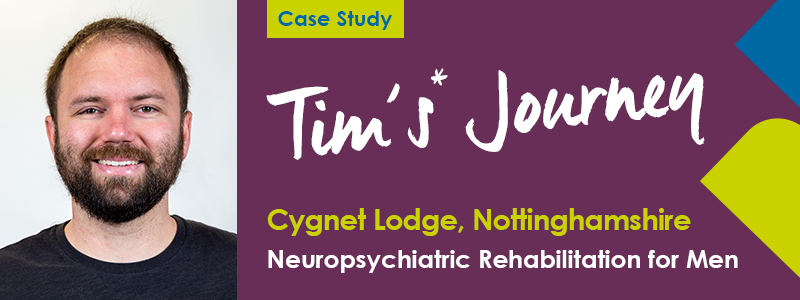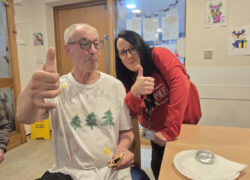
Tim’s* history
Tim had a fall from a significant height as a child, sustaining a traumatic brain injury. This resulted in neuropsychological deficits which impaired his cognitive, language and motor skills. His behaviour and social abilities were also impacted which resulted in him attending special schooling.
Tim lived independently as an adult, but with a lot of support from his father. When he was in his 30s, his father suddenly passed away which affected him deeply. He experienced low mood for a prolonged period, which led to suicidal thoughts. Tim made several serious attempts on his life, which required treatment in specialist neuropsychiatric hospitals.
When he came to us
Tim received many mental health diagnoses throughout his time in hospitals including; Adjustment Disorder, Organic Personality Disorder and, most recently, Schizoaffective Disorder.
He was referred to Cygnet Lodge with the aim of stabilising his behaviour and reduce risk. During his initial admission period, Tim was trying to harm himself many times per week, which meant he required consistent staff intervention and support.
Tim’s Care
Overall, the goal for Tim was to reduce his observations and increase his independence so that he could return to living in the community.
The interdisciplinary team developed an accessible treatment hierarchy in collaboration with Tim. As a result, they were able to structure his treatment needs that were identified in the assessment and formulation period.
Establishing a secure base to promote stability was a challenge for the team. Tim experienced significant trust issues from a young age related to trauma. The nursing and support team took time to build a therapeutic alliance, through consistency and reliability.
The Psychiatrist at Cygnet Lodge completed a medication review, which was an essential step to support Tim to develop and maintain behavioural, mental and emotional stability. Alongside this, psychoeducation and normalisation of the psychotic symptoms helped him to understand his condition and validate his experiences. He understood that rehabilitation may involve living well with a mental health diagnosis.
A case formulation was utilised, involving an overview of Tim’s symptoms and associated strategies and coping mechanisms to help alleviate them. Each department provided support to help Tim to achieve his goals.
The Speech and Language Therapist taught specific social skills through supporting Tim to liaise with his family members. The Occupational Therapist, informed by his work with the Physiotherapist, promoted Tim’s physical independence by encouraging activities such as walking to the local shop.
Whilst the Psychologist offered one-to-one sessions using a cognitive behavioural therapy approach adapted for psychosis (CBTp) to help him understand and manage his thoughts, feelings and behaviours. Alongside this work, Tim’s named nurses really encouraged him to engage in activities to develop his quality of life, such as attending social meals, family celebrations and sporting events.
The team were then able to consolidate the work Tim had completed and look towards relapse prevention and continued recovery. This was really led by Tim, who worked independently to apply the skills the team had helped him develop in a way that was meaningful to him.
Today
Tim has not had any incidents of self-harm in over a year whilst receiving care at Cygnet Lodge. Whilst concepts such as quality of life and social enrichment are notoriously difficult to measure, in discussion with Tim, he voiced that his feelings on this has improved during his time at the service.
Tim is now much more sociable, chatting confidently with both staff and peers. He is also able to forward-think, shown in his planning ahead to visit his mother on her birthday.
Tim is currently preparing to move on to community living.
*Name has been changed to protect his identity.




